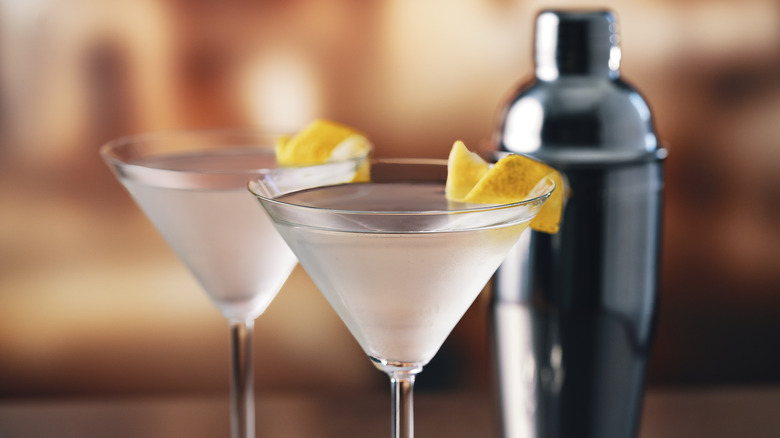The Difference Between A Wet And Dry Martini
The golden age of martinis — or more accurately, the modern renaissance of martinis, since the drink was born around the turn of the 20th century and had another heyday in the 1960s thanks to James Bond — is in full swing. Most bars today offer different martini variations from lychee 'tinis to espresso martinis. But to ignore the drink at its most classic is to really not know it at all. It's a study in simplicity, its quality coming down to the ingredients and their ratios. Because of that, there's quite a bit of hubbub around "martini rules" — should it be with vodka or gin? Dirty or not? What makes for a "perfect martini" and shouldn't they all be perfect? But the simplest question to answer, and the one that will set you up for ordering success at any bar, is: What is the difference between a wet and dry 'tini?
This is easy to remember if you think of "dry" in any other alcoholic beverage context. Beers and ciders can finish sweet or dry, for example. Dry wine contains little or even no sugar. A dry martini, therefore, has less sweetness, and overall less balance for the gin or vodka. A wet martini has more vermouth. Things get slightly confusing when you consider martinis utilize dry vermouth and not sweet vermouth (except for that "perfect martini," which uses both in equal measure), but that's still an element of sweetness compared to the clean, crisp spirit.
Vermouth's presence in the martini is vital -- in whatever amount you prefer
Vermouth's growth enabled the martini's invention as it became a more leisurely sippable way to enjoy gin. Its name possibly derives from the Martinez, a martini precursor using sweet vermouth and maraschino liqueur invented in California in the 1800s, or from Martini & Rossi vermouth; there are several origin theories, many involving vermouth. But that doesn't mean you must go heavy on it for a wet martini to be traditional; for decades, people have enjoyed bone-dry martinis. Winston Churchill is quoted as saying, "I would like to observe the vermouth from across the room while I drink my martini," joking he'd bow in the direction of France, where vermouths like Noilly Prat are made in order to acknowledge the spirit's rich tradition.
Essentially, don't let all the rules and strong opinions around martinis intimidate you — the fact that so many different people can prefer their martinis in so many different ways is part of the fun. You just have to know the basic lingo so you do indeed get what you want at the bar or know how to make what you want at home. Use vodka or gin, go wet or dry, or make a dirty martini with salty, savory olive brine. You can also try that dry-plus-sweet vermouth perfect martini, or strike the perfect balance between wet and dry with a 50/50 martini, in which the vermouth is exactly equal to the gin.

